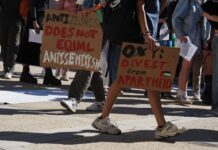Author: Emma Parker
Five Occidental professors attended a “Discipline and War” symposium to discuss different aspects of war within the context of their respective fields of study Thursday, April 5. The panel included a variety of professors from different academic departments who touched on issues ranging from the use of torture to the environmental impact of war.
Assistant Professor of Diplomacy and World Affairs Anthony Chase led the symposium. He began by explaining that each speaker would answer the question, “What can you bring to an understanding of war?” Chase stressed the importance of interdisciplinary discussion and the act of learning from one another.
“We will be talking about war from within our academic disciplines,” Chase said. He said he believed that a subject such as war should not be looked at in an isolated fashion.
The first professor to speak was Chase, who addressed the “dichotomy of idealism and realism” in studying people and countries’ motivations for going to war. “Idealism regulates how war is waged,” he said. “Realism is the belief that politics is the struggle for power.” He expressed concerns that these two ways of thinking cannot be viewed separately, because people always have complex motivations. “There’s a tragic impulse in human society,” Chase said. “We can only try to control war.”
Psychology Professor Nancy Dess spoke about war and “what it means to take an evolutionary perspective on human existence.” She argued that war is culturally constructed and is a particular type of aggression in humans not seen in other animals. Dess explained how war starts and changes. “It is scaled up or down via uniquely human cognition, technology and institutions,” she said.
She then addressed how the role of intimate acts and the case of females can inhibit war. Dess presented food sharing and handshakes as necessary tools in promoting unity and trust and showed that the tendency to make peace differs between genders. This is why many peace organizations in the world are led by women, Dess said.
Adjunct Professor of Religious Studies Malek Moazzam-Doulat discussed many aspects of torture, including creating rules for torture, the purposes of torture and the justification of torture. He used post-9/11 examples to show how our government has redefined torture and went on to talk about why, in situations like this, many feel that there is a need for torture.
“Torture is our only technology of truth,” Moazzam-Doulat said. “Today, we approach everything as a resource; tear it open, transform it and put it to our use.” However, its reliability is not certain, he said.
Associate Professor of Biology Elizabeth Braker spoke on war and its relation to the environment. “War is never an isolated act,” Braker said, “It is a threat to our environmental security.” She used examples such as the Vietnam War and the war in Iraq to show the devastating effects of modern war, including the destruction of marshlands in parts of Iraq. Braker also addressed the opportunity cost of war by arguing that money spent on war could easily be spent on pressing environmental issues.
Professor of Art History & Visual Arts Mary Beth Heffernan talked about the tattoos that marines who fought in Iraq got to memorialize battles and fallen comrades. “A tattoo is a prompt for both stories and a cover of silence,” Heffernan said.
“Symbols can anchor the meaninglessness of death and assign meaning.” Heffernan concluded with a presentation of different tattoos that marines chose. “They’re permanently flagging their own trauma,” she said.
Approximately 70 people, including faculty and students, were present during the event.
This article has been archived, for more requests please contact us via the support system.
![]()





































